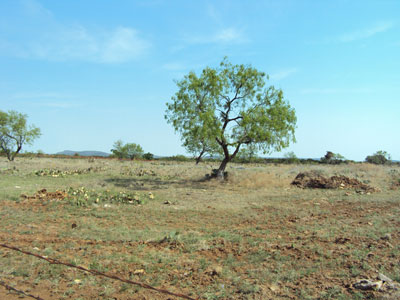
Mesquite trees are great signs of the last cold spell. They do not normally leaf out before the weather is safely warm. I saw some mesquites just beginning to put on leaves this past weekend. (Author’s collection)
As I write this, it’s Good Friday with a chilly breeze in the air. As I look through my Farmer’s Almanac, I suddenly remember The Easter Cold Spell. I have tomatoes in the ground in my garden as well as onions. Five pepper plants are ready to go in the ground. And my weather app tells me the lows this weekend will be in the middle 40s. Yikes! I’m really pushing it with no empty milk cartons to put over the tomatoes. The onions will be ok and I haven’t planted the peppers yet.
Such are the thoughts of a 21st century backyard gardener. But what about those before us who had no weather apps, no radar reports, nor plastic milk cartons? How did they handle gardening?
First of all and most importantly, they knew weather signs. They knew to plant onions in the middle of February. They knew if March had April weather, April would have March weather. Does that mean we are in for wind and storms soon?
Did you hear any thunder in March? If you did, look forward to a fruitful year of garden vegetables, fruit trees, and livestock. But dust in March will bring grass and foliage.
Thunder on April Fools Day brings a good crop of corn and hay. Hmm, my weather app says clouds Sunday but no thunderstorm. We’ll have to wait to see.
A moist April brings a clear June; a cloudy April brings a dewy May.
Those wispy, thin clouds that look like jet trails from airplanes are signs of good weather. But cumulus clouds in morning or early afternoon that develop into thunderheads, the top of the clouds higher than the width at the base, indicate a chance of thunderstorms. We will probably have a rain shower in there is a rainbow in the west in the morning. One of my grandfathers born in the Chickasaw Nation remembered as a youngster seeing clouds form in the afternoon west of the house and hearing thunder, but the rain never came. This was during the 1890s when drought sent Texas cattlemen north into the Territory for better grass and water. The family moved back to Texas before 1900.
One last folk weather wisdom says that a ring around the moon means rain real soon. On the other hand in the children’s book Black Beauty, the boy feared that a ring around the moon meant that death would soon appear and take his beloved horse.
We can go on forever with these tales, but many do have scientific basis. When the earliest settlers headed west they brought with them a waterproof leather pouch filled with seeds. This bag was as valuable as the wife or children because it was the settler’s future. Before the harvest, the settler would survey his crops, pick seeds from the more prolific plants, and put them in the leather bag when dried. Settlers were known to “stop and raise a crop”. They needed food, seeds, and rest for themselves and their livestock. Finding a place with fertile soil and adequate water, they often set up camp, sowed a garden or wheat field, and stayed for weeks or months before moving on.
If you find an ancestor born in a state you know the family never lived in, the baby was probably born while its parents were “raising a crop.” However, I am very glad that my garden is a fun challenge for me. If we need fresh vegetables or fruit, there are several grocery stores in town.
